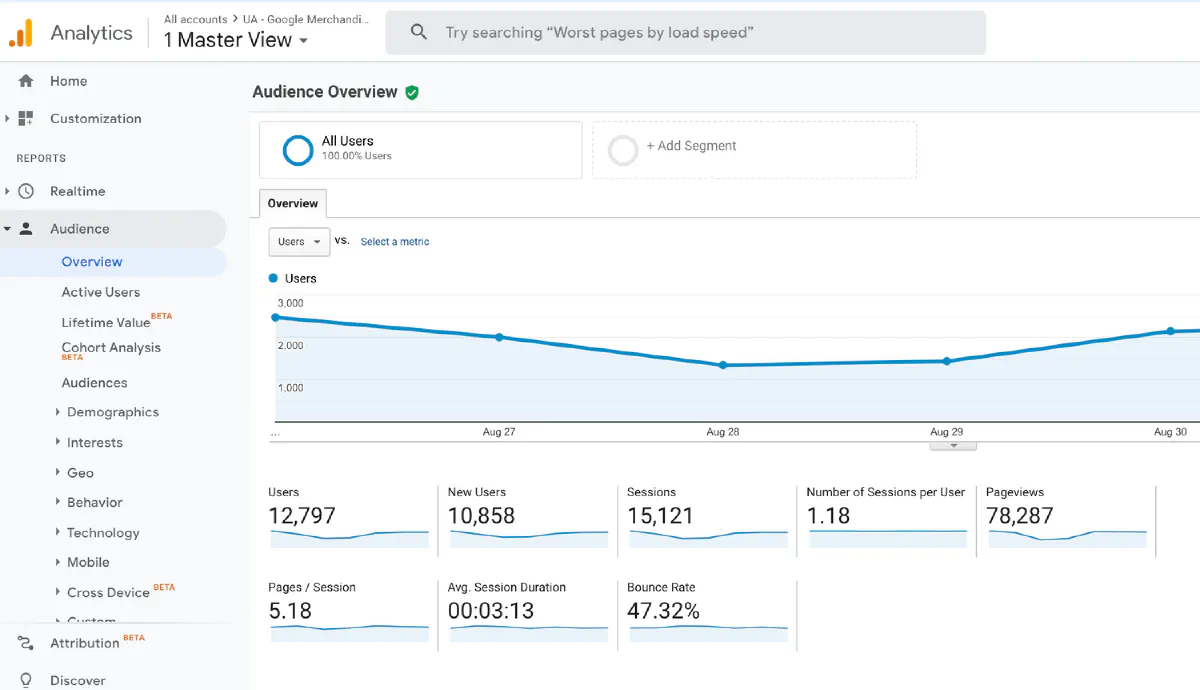Category:Scraping Use Cases
Scraping Google Analytics for Optimization Studies

Full Stack Developer
When people are very limited in doing research on the internet and they need big data, they resort to data extraction, or web scraping as we know it. In this sense, we can see that the reliable data of Google Analytics are scraped and used in optimization studies.
What is Web Scraping?
The data is presented as accessible by people or other systems for different purposes and in different channels. This access can be open or limited. It is not a requirement for the data to be human-readable at the stage of recording and presenting it. But for blog content, social media stream, or an article in pdf format, of course, readability will be an important criterion. This is how search engines to scan, interpret and classify content in the context of the algorithms used. This whole process is expressed in a general term; data scraping.
Data scraping, in general terms, refers to the process of extracting data from a data source by a computer program.
Best Web Scraping API & Rotating Proxy
Start Free Trial
Process of Web Scraping
A URL is needed for web scraping. A request is made to the URL and the incoming response is scanned to extract the requested data from its content. Making and displaying requests is basically a web browser behavior. Hence, web crawling can qualify as the main component of web scraping. Many operations such as searching, filtering, parsing, reformatting, and copying can be performed within the response from the server.
Web scraping can be used for various purposes such as browsing, journalism, web indexing, data mining, price and product tracking/comparison, and more. Web scraping can be performed with many different techniques on the basis of programming language and applications:
- JavaScript codes that can be processed through the developer tools and console of modern web browsers can be considered as one of the methods.
- Different solutions can be considered, such as ScraperWiki5 and Selenium6.
- Libraries of programming languages such as Python and R can be used.
Can Google Analytics Export All Data?
There is always an obligation to export all Google Analytics data at once. Users need historical data. They cannot manually export Google Analytics data for different time periods or ranges. However, you may see here 3 ways to export all Google Analytics data:
- Manually: It may take some time depending on the volume of data you have in Google Analytics.
- Export aggregate reports to Google Sheets using the Google Analytics plugin.
- Export bulk reports using the Google Analytics API.
How to Export Data from Google Analytics?
Google provides people to reach programmatic access to GA data via Reporting API V4. The data is structured in terms of dimensions and metrics. We can say dimensions are the factors based on collected data and the metrics are keys that provide info.

Google Analytics provides us with a set of dimensions and metrics by default. Users are able to create their own dimensions and metrics just by making minor changes to the tracking code which is distributed with the website. To get raw hit-level data from Google Analytics, you should use some customized dimensions.
Data Extraction with Python
Some of the data conversion tools most commonly used by data scientists today are Python and R. Google Analytics is one of the main and reliable sources used to view reports in the field of digital marketing. On the other hand, if you need to do optimization studies or deep analysis like machine learning, you can use R or Python to extract data from Google.
Why is Web Scraping Important?
Web scraping provides many benefits to businesses, firms, research firms, researchers, journalists, and competing firms. Let's examine:
Price Monitoring
By collecting data from various e-commerce sites, you can use it in projects such as dynamic pricing, competitor analysis, and investment decision-making for your product or products.
Outsourcing Data for Finance
In finance, social media data and external source data that can be used outside of customers' financial risk reports are also very important. It is very difficult to calculate credit risk, especially for someone who has not registered with banks before, banks try to predict whether they will pay the loan by looking at the person's actions on social media, or they do psychology tests from outside sources.
Sentiment Analysis
You can continuously increase your customer expectation and experience by constantly scraping and analyzing social media data by establishing a sentiment analysis model to learn how your company is perceived on social media.
News and Content Tracking
You can instantly follow what is said about you, what kind of news is made about your company, not only on social media but also on modern media, and you can take action accordingly. Also, you can also clarify your decision on how or where to invest by analyzing the data about the company you will invest in.
In this sense, you can carry out many projects professionally and add added value to both yourself and your company. In the age of the internet where information is unlimited, the information obtained through data scraping can be very valuable. Many companies are now aware of the importance of data scraping and are using it extensively in their work.
{{< link "https://scrape.do/blog/how-can-data-scraping-benefit-my-e-commerce-business/" "Learn more about how web scraping can help your business." >}}

Full Stack Developer












